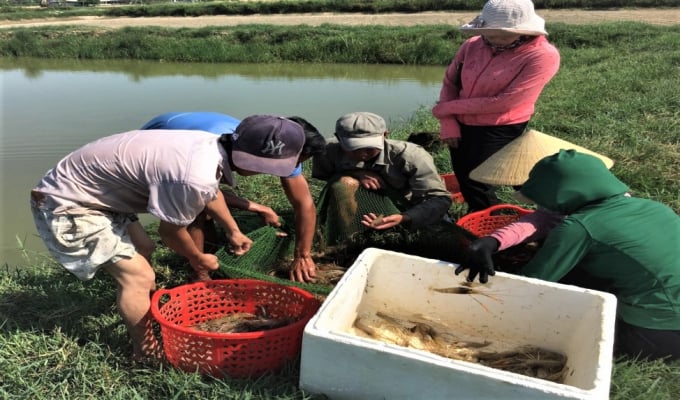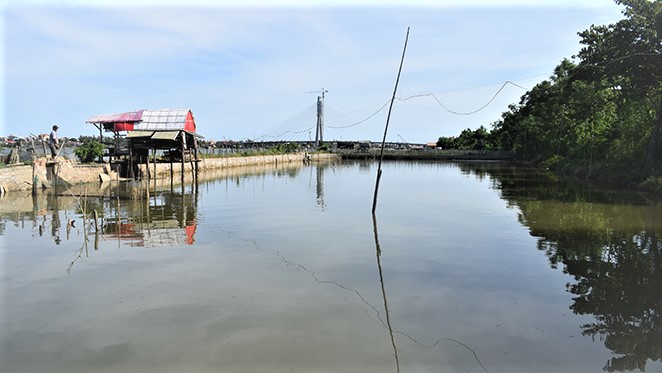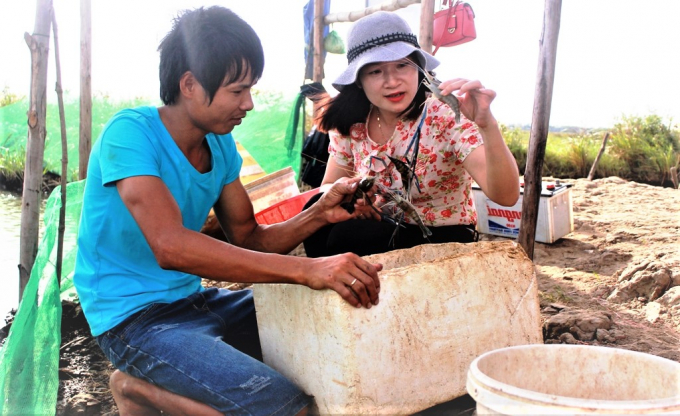November 27, 2025 | 23:56 GMT +7
November 27, 2025 | 23:56 GMT +7
Hotline: 0913.378.918
November 27, 2025 | 23:56 GMT +7
Hotline: 0913.378.918
The co-management model has been launched by the Sub-Department of Fisheries, Provincial Department of Agriculture - Rural Development in three districts - Quang Ninh, Le Thuy and Quang Trach since early 2020.
It aims to support aquaculture households in the region to jointly manage, support and help each other and improve production efficiency. The model has been highly appreciated by farming households and localities.
The success of the model has motivated Quang Binh Fisheries Sub-Department to continue to implement it at the Aquaculture Cooperation Groups (ACG) in Quang Thuan Ward, Ba Don Town and Ha Trach Commune, Bo Trach District.

The farming households in the Aquaculture Cooperation Groups have worked together and supported each other to achieve effectiveness in production. Photo: Trong Hieu.
According to engineer Nguyen Quoc Chung, an officer of the Division of Aquaculture and Fisheries Resources Development, under the Quang Binh Fisheries Sub-Department, commercial shrimp farming areas in the province have made good progress in productivity, technical level and facilities.
However, such progress lacks unity as each farmer applies technical measures in his own way, causing difficulties in the management of the farming area, he added.
To help people implement the model properly, the Fisheries Sub-Department has assigned specialists to directly train farmers with shrimp farming techniques, seed selection and disease prevention. Meanwhile, the unit has coordinated with cooperatives to develop group regulations and conduct activities in accordance with the actual situation in the localities.
From the organizational regulations, the ACGs have gradually implemented production management and administration, such as organizing periodic meetings to exchange, unify production plans and solve arising problems, especially during the time of the pandemic; funding for operation maintenance…
In addition, the Sub-Department has also supported the purchase of quality shrimp seed, equipment to measure the environment of pond water, disinfectant lime and implementation of general epidemic prevention measures.

The aquaculture environment has been managed and bettered since the implemenation of the co-management model. Photo: Trong Hieu.
According to Tran Van Dien, team leader of community management in aquaculture in Quang Thuan Ward, Ba Don Town, the local ACG has 40 households participating in the co-management model in sustainable aquaculture with an area of 25.04 hectares.
Farmers in the area used to raise shrimps mainly on a small and spontaneous scale with limited farming knowledge, so the shrimps often suffered from diseases and had low productivity.
On participating in the co-management model, households commit to strictly follow the process of stocking in a sustainable way without causing environmental pollution. In each farming season, the members will agree on the time of draining, watering, stocking and harvesting while members will be assigned to strictly manage these stages.
In Ha Trach Commune, Bo Trach District, 123 households with an area of 100 ha have participated in the community management model in aquaculture.
“The association and mutual support in aquaculture has helped households improve the quality of seed productivity. Seeing the success of the co-management model in sustainable aquaculture, many shrimp farming households in the area have registered to participate in the local ACG,” said Luu Van Phuc, head of the district’s ACG.

The co-management model has brought about efficiency in shrimp production and consumption. Photo: Trong Hieu.
In addition, members of ACG must strictly manage the use of feed and chemicals in ponds to avoid polluting water sources. In case the shrimp is sick, it must be reported to the management board to find the solution, preventing the diseases from spreading widely.
ACG will hold a regular meeting once a month to manage the production in the team, which helps to come up with a consensus on the production plan among the members and solve arising problems, especially when the epidemic occurs.
In addition to the operation fund, participants of the model also contribute an additional 1 million dong/person to raise funds for members with difficult situations and reward households with excellent achievements.
According to the leader of Quang Binh Fisheries Sub-Department, the co-management model in sustainable aquaculture has initially brought high economic benefits to its members though it has only been implemented for a short time.
The model has helped aquaculture households in the region connect and support each other in production, disease prevention and consumption. Since then, it has contributed to improving production efficiency, strengthening solidarity and unity in the whole farming area, aiming to develop sustainable shrimp farming and therefore should be widely implemented in Quang Binh Province.
Translated by Phuong Ha

(VAN) According to Mr. Vo Minh Thanh, Director of the Tay Ninh Department of Agriculture and Environment, Resolution 57 has created a new development pathway for the locality, shifting from traditional toward modern agriculture.
/2025/11/26/4909-2-154329_878.jpg)
(VAN) Pearl grouper farming in HDPE cages not only delivers economic efficiency but also contributes to protecting the environment, creating jobs, and promoting marine-based experiential tourism.

(VAN) The model of making a living under the forest canopy through the agroforestry system in Van Son commune, Bac Ninh province, is expected to generate an annual income of approximately VND 30 million/ha.

(VAN) Many enterprises in Can Tho are harnessing natural energy and reducing greenhouse gas emissions in their production processes, thereby contributing to the promotion of a sustainable green transition.
/2025/11/24/3536-2-112800_176.jpg)
(VAN) Dong Nai now has tens of thousands of hectares of forests certified for sustainable management, and this area will continue to be expanded in the coming period.

(VAN) Vinh Ha hamlet (Dai Xuyen commune, Hanoi) is shifting away from small-scale farming as households adopt bioscurity into their breeder chicken models.

(VAN) Heavy rains make aquatic species more vulnerable to disease. Proactive water management and high-tech systems help farmers prevent outbreaks and protect yields.